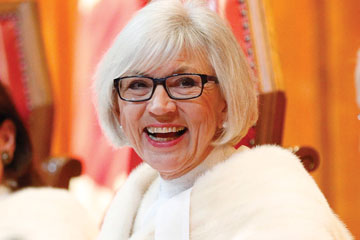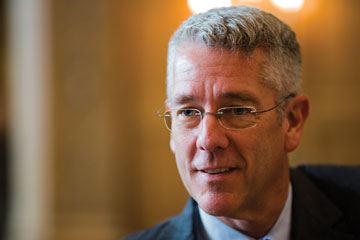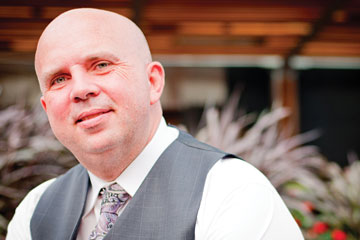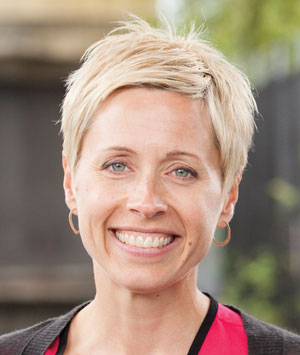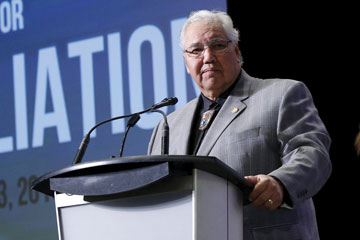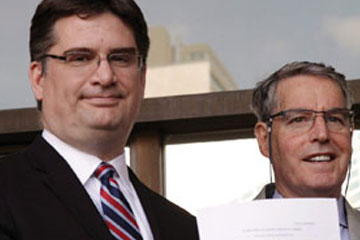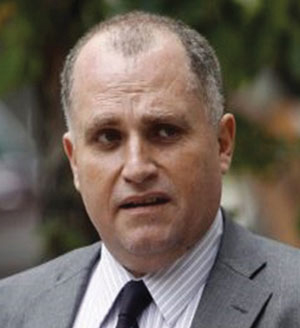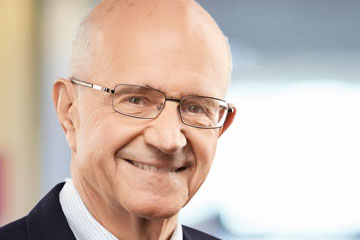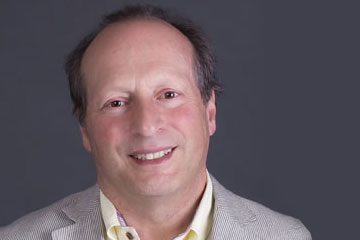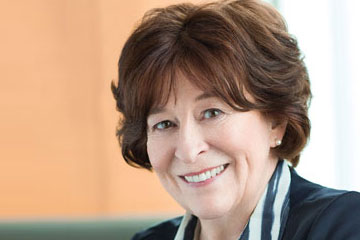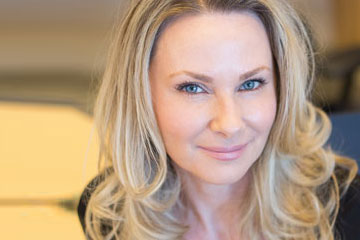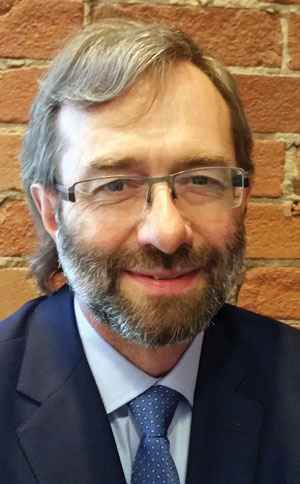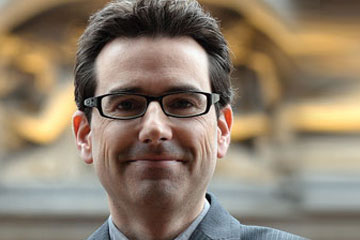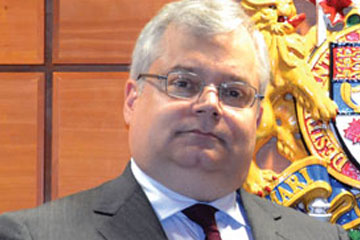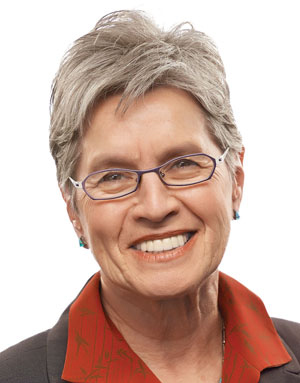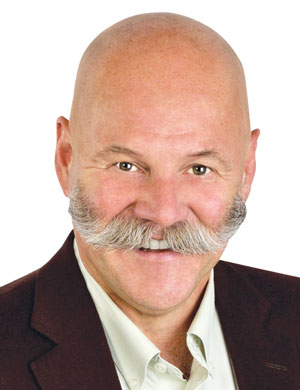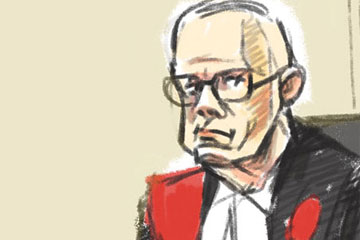Canadian Lawyer’s Top 25 Most Influential in the justice system and legal profession in Canada is now in its sixth year. Every year, the Top 25 is the magazine’s most-read, and most commented-on, feature. And once again, the number of nominations as well as votes in our public poll show how engaged our readers are in supporting and highlighting their colleagues who are doing extraordinary things both within the profession as well as beyond it.

Canadian Lawyer’s Top 25 Most Influential in the justice system and legal profession in Canada is now in its sixth year. Every year, the Top 25 is the magazine’s most-read, and most commented-on, feature. And once again, the number of nominations as well as votes in our public poll show how engaged our readers are in supporting and highlighting their colleagues who are doing extraordinary things both within the profession as well as beyond it.
As in previous years, we put out a public call for nominations to legal groups and associations representing a variety of memberships and locations; last year’s Top 25 honourees; our readership; and our internal panel of writers and editors.
We received an incredible 135 nominations, which the internal panel whittled down to the 120 candidates who met our criteria. We then posted that list online and polled our readers for their votes — and you let us know in droves what you thought. The number of voters increased by a third over last year, with 9,105 people participating and commenting on those who they thought made their mark over the past 18 months. The final list of 25 is based on that poll with input and the last word from the Canadian Lawyer editorial panel.
Being named one of Canadian Lawyer’s Top 25 Most Influential is not just about those who’ve steered the biggest deals or made the most splash on the news pages — although those are a part of it. Closing a big deal, for instance, may not have a substantial impact beyond that particular business or industry. We aim to select lawyers who have been influential within the profession as well as society over the last year and a half — both at home and beyond Canada’s borders. Inclusion in the Top 25 talks to a level of respect, the ability to influence public opinion, and to help shape the laws of this country and others; contribution to the strength and quality of legal services; involvement and impact within the justice community; and social and political influence and involvement.
The Top 25 is split into five areas of influence with five winners in each of the following categories: government, associations, and non-profits — including courts, public inquiries, and officers of Parliament; changemakers; criminal and human rights law; the world stage; and corporate-commercial law. Nominees were put in the category in which the individual exercised their influence during the time period.
A number of previous honourees are back this year: perennial winner Supreme Court of Canada Chief Justice Beverley McLachlin; perpetual rabble rouser Rocco Galati, who is intent on making the government actually follow the law; and Louise Arbour, Murray Klippenstein, and Pascal Paradis all in the world stage category.
For the first time, we have included a write-in candidate. Justice Murray Sinclair, who made the list last year for his contributions as the chairman of the Truth and Reconciliation Commission, wasn’t on our list of nominees but with the release of the TRC’s recommendations and executive summary of its hearings, Sinclair’s impact and influence on Canadian society deserved mention.
There are also some great new additions to the list this year including Omar Khadr’s lawyers Dennis Edney and Nathan Whitling, who are only the second duo to win the honour for their combined accomplishment. Marie Henein, who has had some of the most noteworthy clients this past year including former CBC radio host Jian Ghomeshi, has a very high profile. The changemakers category boasts a slew of new names including fertility law expert Sara Cohen, Crown attorney Allison Dellandrea, law firm re-engineer Mark Tamminga, and Calgary law professor Alice Woolley — all of whom have been instrumental in making change across a wide range of areas.
This year’s top vote getter was Louise Arbour, who has knocked off McLachlin, who has held that title for most of the Top 25’s six-year run. For the first time in her storied career, Arbour joined a law firm last year becoming counsel in residence at Borden Ladner Gervais LLP in Montreal, where she’s providing strategic counsel as part of the firm’s litigation practice. Voters in the online poll variously described Arbour as “Canada’s legal star abroad,” and an “international superstar.” That sentiment is likely why she was awarded with her own star on Canada’s Walk of Fame recently. One voter went so far as to say Arbour made them “proud to be Canadian.”
While only 25 of the impressive nominees made the final list, every single one of them made a distinct impact and their accomplishments are many, and varied — not to mention what many of them have done behind the scenes or on a pro bono or volunteer basis. It’s these lawyers and judges from across Canada and many different areas of practice who uphold the greatest ideals of the profession and are worthy of recognition.
In the following pages, we present the Top 25 Most Influential for 2015. They are listed with the top vote getter in each category first, followed by the others in alphabetical order.
Want to add your own kudos? Disagree with the choices? Did we miss someone obvious? Post comments below or e-mail to [email protected]. We’ll be doing it all again next year
GOVERNMENT/NON-PROFITS/ASSOCIATIONS
Justice Beverley McLachlin
Chief justice, Supreme Court of Canada, Ottawa, Ont.
A frequent member of the Top 25 list and the top vote-getter in years past, McLachlin continues to make waves, handing down two very significant decisions on aboriginal law. The 2014 Tsilhqot’in Nation v. British Columbia decision led by McLachlin is the first of its kind in the history of British Columbia. Last year the Supreme Court of Canada granted declaration of aboriginal title to over 1,700 square kilometres of land. She is also responsible for upholding the decision of the Ontario Court of Appeal in Keewatin v. Ontario (Natural Resources) released in July 2014, “she has overhauled what the Lamer court started and has left her mark in this area for decades to come. The chief justice continues to be a powerful proponent of greater justice for all Canadians. As her incredible number of votes once again this year show, McLachlin is greatly admired not only for her rulings but also her public support in favour of free speech, diversity, and inclusive leadership.”
What voters had to say: “A brilliant judge who, time and time again, marries the law with common sense.” “Justifiably most respected legal mind in the country; remarkable integrity; trusted public servant; clearly guided by the law and a strong moral compass.”
Jean-Pierre Blais
Chairman, Canadian Radio-television and Telecommunications Commission, Ottawa-Gatineau
Blais is not afraid of criticism and is willing to go above and beyond in the name of consumer rights. A recent CRTC decision will give consumers more freedom to choose TV channels of their liking as part of their satellite and cable subscriptions despite bitter opposition from Canada’s cable companies. Blais called out former Bell Media president Kevin Crull, without naming names, over reports Crull told CTV news staff not to interview him after that decision. Crull ended up apologizing for interfering in the news gathering process and later stepped down. From telemarketers to telcos, Blais consistently aims to support the rights and needs of consumers.
What voters had to say: “Achieving big change with consumer-minded focus. About time!”
Orlando Da Silva
President, Ontario Bar Association, Toronto, Ont.
Da Silva’s heartfelt public confession of a long and deep depression and attempted suicide has opened up discussion on mental health within the legal community like never before. While there is a deep-rooted stigma against mental illness facilitated by a dominance of type A personalities, Da Silva’s courageous leadership has helped create specialized support programs for lawyers who struggle in silence. As if that was not enough, Da Silva has gone one step further and asked lawyers to call him personally if they need support. His supporters underline that Da Silva’s efforts are crucial in an industry that encourages bravado and often mistakes mental illness for a personal weakness.
What voters had to say: “Mr. Da Silva’s bravery in grounding increasingly acknowledged mental health issues in the legal profession in his own personal experience will crucially advance these concerns among lawyers and lead to positive ends.”
Katrina Pacey
Executive director, Pivot Legal Society, Vancouver, B.C.
Pacey was recently appointed executive director of Pivot Legal and continues the good work of her predecessors. Pivot focuses on issues related to health, police accountability, drug policy, and homelessness, poverty, and sex workers’ rights. She may be best known for her role in the Bedford case, but Pivot is about more than that and frequently has intervener status in major Supreme Court of Canada cases, including the recent one on mandatory minimums. She is also gifted at bringing on board highly respected counsel to work pro bono on many of these cases that can really affect the lives of some of the city, and country’s, most vulnerable citizens.
What voters had to say: “Incredible dedication to social justice at every level with keen passionate intelligence. She has helped change draconian laws that threaten the lives of sex trade workers and restore dignity to people who have been marginalized.”
Justice Murray Sinclair
Chairman, Truth and Reconciliation Commission, Winnipeg, Man.
A rare write-in candidate winner for this year’s Top 25, Sinclair was on the list last year, making headlines again in June with the release of the summary of the report of the TRC along with 94 recommendations to redress the “cultural genocide” of Canada’s residential school system. Over six years, Sinclair led the TRC hearing the stories of more than 7,000 survivors of sexual, physical, and mental abuse. Sinclair, who was the first aboriginal judge in Manitoba, was first appointed to the provincial court where he became associate chief in 1988 and then elevated to the Court of Queen’s Bench in 2001. He was co-commissioner of Manitoba’s Aboriginal Justice Inquiry in 1988 and presided over a 2000 inquest into the deaths of 12 infants at Winnipeg’s Health Sciences Centre. Sinclair hopes to complete the commission’s full report in the near future, following which he will decide whether to go back to court or retire and advocate for native rights full-time.
CHANGEMAKERS
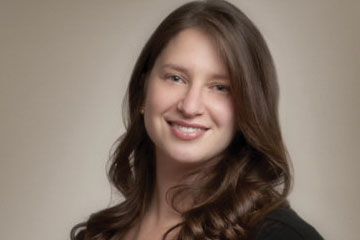
Sara Cohen
Founder, Fertility Law Canada at D2Law LLP, Toronto, Ont.
Cohen has devoted her career to two activities that have changed the practice of fertility law for the better in Canada and beyond. She has spent countless hours teaching and mentoring on the subject of fertility as an adjunct professor, at home and abroad. Her collegiality in a notoriously competitive area of the law, truly underlines Cohen’s dedication to improving the practice of fertility law. More importantly she pushes for change she wants to see in this burgeoning area of the law. Recent lobbying efforts are sure to pay off; among them to obtain coverage for in vitro fertilization services through Ontario’s health plan as well as changes to the family law legislation that would clarify that a sperm donor is not a parent just by virtue of being a donor. Lastly, she is the first adjunct professor in the country to offer a course exclusively devoted to reproductive law in Canada, helping clear the path for future area practitioners.
What voters had to say: “Sara has been instrumental in improving the law in assisted reproductive technology.”
“Genuinely cares about her field of expertise. This isn’t just a job for Sara, it is her passion.”
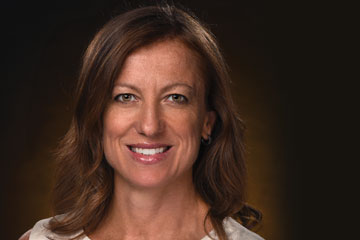
Allison Dellandrea
Crown counsel, Ministry of the Attorney General,Toronto, Ont.
Dellandrea has been a key player in advancing the understanding of crimes against children by law enforcement officials, fellow lawyers, and the judiciary. She was involved in a child sexual abuse case in March where Ontario’s former deputy education minister Ben Levin pleaded guilty to child pornography related charges. The charges included making written child pornography, counseling a person to commit a sexual assault, and possession of child pornography. Dellandrea’s role as a Crown includes being the education lead for Ontario’s provincial strategy on Internet crimes against children. She is an instrumental leader in this area within the justice department.
What voters had to say: “Allison is a tireless resource and is the penultimate legal mind for a prosecutorial position on all things related to child exploitation and sexual assault offences. For such a difficult subject that inherently involves very taxing emotional and legal issues, Allison always has time to provide sound advice to other Crowns prosecuting these very difficult and sensitive offences. Her efforts have made a tangible difference in making our society safer.”
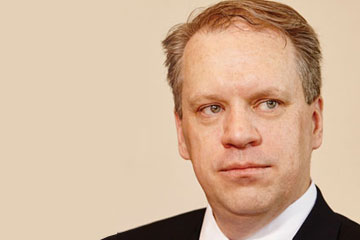
Fred Headon
Assistant general counsel, labour and employment law, Air Canada, Montreal, Que.
As chairman of the Canadian Bar Association’s Futures Initiative, Headon has given more than 25 presentations to lawyers, law students, professors, librarians, law firm staff, and regulators from Toronto to Buenos Aires, Victoria to Halifax, in person and online. The Futures report was released in August 2014 and its recommendations place Headon squarely in the midst of many important discussions on subjects essential to the profession. He continues to lead the Futures steering committee as it now turns its recommendations into action. Headon is an integral part of the discussion on the future of the profession and he was the first in-house counsel to become the president of the CBA.
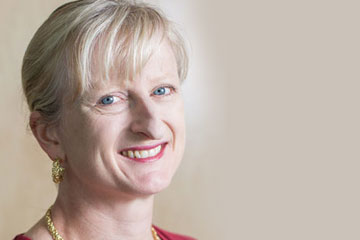
Alice Woolley
Professor and associate dean-academic, University of Calgary Faculty of Law, Calgary, Alta.
Woolley is a true changemaker in the area of law and technology as well as law regulation. She has been a valuable member of the Canadian Bar Association’s ethics and professional responsibility committee. Her work with the CBA Futures project as an ethics and regulatory issues team member is truly making a mark in the legal community. Woolley is also responsible for sweeping educational changes as chairwoman of the committee that developed and adopted significant curricular changes at the University of Calgary’s Faculty of Law, which focus on the practical elements of legal education and will come into effect in September.
What voters had to say: “Leading expert on legal profession and ethics; when she talks, people listen.”
“Alice is a pragmatic visionary. Teaching law students in a way that will prepare them for a 21st century practice is of critical importance to the future of our profession.”
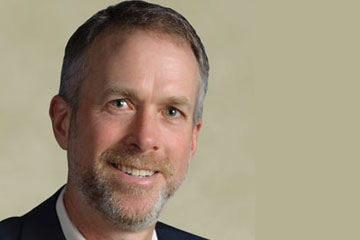
Mark Tamminga
Partner, Gowling Lafleur Henderson LLP, Hamilton, Ont.
Tamminga has devoted his career to automating legal practices. His information technology focus began in 1986 while he was still a law student and was given the task of systemizing the production environment for mortgage files. Since then, Tamminga’s aptitude for legal technology has only grown with Gowlings LLP. Three years ago, he was named Gowlings’ Innovation Initiatives leader. He is responsible for automating the Gowlings recovery services practice. He has designed and built a number of additional practice systems in the areas of debt collection, loan placement, and civil litigation. His role has required re-thinking the thornier aspects of large firm operations: managing cultural change, inducing client-side thinking, and building the compensation mechanics, which drive new behaviour.
CRIMINAL / HUMAN RIGHTS LAW
Dennis Edney and Nate Whitling
Defence counsel, Edmonton, Alta.
In a rare move, Edney and Whitling are being named as Top 25 honourees as a team. Both have spent more than a decade advocating for Omar Khadr, almost universally on a pro bono basis. From Guantanamo Bay to the Supreme Court of Canada (three times), the unlikely duo have fought for Khadr to have him released from prison (success in May), have him treated as a child soldier, and otherwise continue to battle for his legal rights at home and abroad. It’s been what the Globe and Mail called waging “a war of legal attrition against the government,” which has consistently done everything to paint Khadr as a dangerous terrorist who should be kept behind bars. Edney, a former soccer player who only started practising law at 40, has been the public and media face of the continuing legal battles, even taking Khadr into his own home after he was recently released on bail. Whitling, a Harvard law grad and former SCC clerk, is a much more quiet and reserved force behind the scenes.
Whitling is an “intelligent and highly effective advocate who stays out of the limelight.” He is a “fantastic lawyer. Exceptionally intelligent and excellent to work with.”
Rocco Galati
Rocco Galati Law Firm PC, Toronto, Ont.
Rocco Galati is famous for being a one-man opposition to the present government, so far spending $42,000 of his own money on court challenges. He successfully launched a case that blocked Stephen Harper’s appointment of Justice Marc Nadon to the Supreme Court of Canada. His opposition to the appointment of Federal Court of Appeal Justice Robert Mainville to the Quebec Court of Appeal was not as successful. While he doesn’t always win, Galati is dogged in his efforts to defend the Constitution against a government he sees as pushing the boundaries with a lack of respect for the Charter of Rights and Freedoms. He’s now also been elected as bencher of the Law Society of Upper Canada and it will be interesting to see what he brings to the regulation of the profession.
What voters had to say: “A true Canadian constitutional and human rights hero.”
Marie Henein
Senior partner, Henein Hutchison LLP, Toronto, Ont.
Considered one of Canada’s best criminal defence lawyers, Henein is known for representing high-profile clients including former CBC radio host Jian Ghomeshi — charged with seven counts of sexual assault, of which two have already been dropped — former Ontario attorney general Michael Bryant, and junior hockey coach David Frost. Most recently Henein has taken on the case of defence counsel colleague Leora Shemesh, who was charged with perjury and obstruction of justice by Peel Police. Henein is well known in the profession as a go-to lawyer for all high-profile criminal matters. She has an excellent track record of wins versus losses and was part of the team that recently was victorious in having John Salmon’s conviction in a 1970s murder overturned.
Frank Iacobucci
Senior counsel, Torys LLP, Toronto, Ont.
This retired justice has set the bar for police treatment of the mentally ill. His 2014 landmark report outlined 84 sound ways of helping to prevent shooting of mentally ill people by the Toronto Police. The implementation of the report would go a long way toward avoiding disastrous confrontations between police and emotionally disturbed individuals. Some of the recommendations include the use of body-worn cameras and optimized use of tasers. The report is a powerful message that the status quo is no longer acceptable. As a Torys counsel, Iacobucci is used to advising government and business on important legal and policy matters.
Lorne Waldman
Waldman & Associates, Toronto, Ont.
Waldman is a great defender of refugees, immigrants, and human rights. He has won a number of important victories, including health care for refugees in Canadian Doctors for Refugee Care v. Canada and a woman’s right to wear the niqab while making her citizenship oath in Ishaq v. Canada with his associate Naseem Mithoowani. He also argued at the Supreme Court of Canada in J.P. v. Canada and G.J. v. Canada, that Canada’s anti-human smuggling provisions should include asylum seekers engaging in mutual assistance. Along with Peter Edelmann, he acted on behalf of the CBA in the Harkat case before the SCC in 2014. On the international stage, he represents Mohamed Fahmy (alongside Amal Clooney), the Canadian journalist working for Al Jazeera. He has also been a vocal opponent of Bill C-51 and changes to Canada’s citizenship law.
THE WORLD STAGE
Louise Arbour
Counsel, Borden Ladner Gervais LLP, Montreal, Que.
An international lawyer who has recently settled back in Canada, Arbour has certainly earned a spot on the Canadian Lawyer’s Top 25 Most Influential list again this year. She is a winner of the 2015 Simons Foundation Award, recognizing world leaders who shape and create an environment for a safer and more just world. Arbour has spoken out against prolonged use of solitary confinement and has been inducted into Canada’s Walk of Fame. She has been a Supreme Court of Canada judge, an international war crimes prosecutor, and a law school professor. Her ability to pick things up quickly led her to various roles nationally and internationally. Arbour says economic disparities between and within counties is the number-one inexcusable human rights issue at the moment. Always craving new and challenging environments, just last year she finally did something she had never done: joined a law firm in Montreal where she continues to fight for human rights.
“International superstar.”
Dawn Devoe
General counsel, World Vision Canada, Toronto, Ont.
Devoe is World Vision’s key legal adviser for its No Child for Sale advocacy campaign aimed at ending child labour and human trafficking. As lead counsel for the Canadian negotiations regarding World Vision’s partnership with the United Nations World Food Programme, she has represented the organization at global partnership meetings in South Africa, Kenya, and the Philippines. This partnership accounts for more than $30 million of annual food aid programmed through World Vision Canada. With projects in nearly 100 countries across the globe, Devoe manages a busy legal department and has been able to remain flexible and nimble.
“Brilliant legal counsel, very creative problem solver, able to incorporate legal and taxation laws into a beneficial solution to all parties.”

Pascale Fournier
Professor & research chair, legal pluralism and comparative law, University of Ottawa Faculty of Law, Ottawa, Ont.
Fournier has achieved international recognition for her groundbreaking work on gender, religion, and the law, using fieldwork interviews with women from various countries to highlight the complex interplay between religious and secular law. She has received numerous national and international awards and nominations in 2014. Fournier became a fellow of the prestigious International Women’s Forum for her role as a leader in the legal profession; receiving the Canada-Arab Chamber of Commerce Award for “academic excellence and contribution to humanity.” Fournier represented the University of Ottawa as a successful leader in the Governor General’s Canadian Leadership Conference and was unanimously appointed by the National Assembly of Quebec to the Quebec Human Rights and Youth Rights Commission.
Murray Klippenstein
Founder, Klippensteins Barristers & Solicitors, Toronto, Ont.
Back for the second year on the Top 25, Klippenstein’s ongoing representation of 13 members of the indigenous Mayan Q’eqchi’ population from El Estor, Guatemala, continues to make waves. Three related lawsuits are before the Ontario courts against Canadian mining company Hudbay Minerals over the brutal killing of Adolfo Ich and the gang rape of 11 women from Lote Ocho. In a precedent-setting ruling in July of 2013, an Ontario court decided that lawsuits can proceed to trial in Canada over the objections of Hudbay Minerals. At home he is also taking on the big guys in a case against Encana Corp. that’s challenging the regulation and practice of hydraulic fracking in Canada.
Pascal Paradis
Executive director, Lawyers Without Borders Canada, Quebec City, Que.
Also back for his second time on the Top 25, Paradis is an unstoppable force and a passionate advocate for human rights, particularly for women and children. Thanks to Paradis’ initiative, the Quebec bar joined LWBC to act as international counsel in favour of Raif Badawi, the Saudi blogger condemned to jail and flogging for his comments criticizing the regime. Since January 2015, Paradis and LWBC are leading a consortium of Canadian organizations working on a wide-range five-year project to foster justice. They aim to implement means of prevention and reconciliation for women victims of sexual violence and other persons affected by the Malian armed conflict. He also speaks at many international conferences on human rights issues.
What voters had to say: “He has left a very profitable position in a big national law firm to head LWBC for a very small paycheque because he followed his heart and his passion.”
CORPORATE-COMMERCIAL
Justice David Stratas
Judge, Federal Court of Appeal, Ottawa, Ont.
Stratas penned perhaps the most talked-about decision in the area of employment law this year. It will affect federally regulated employers and employees for years to come. His February Federal Court of Appeal decision in Wilson v. Atomic Energy of Canada flies in the face of 40 years of law allowing federally regulated employers to dismiss employees without cause. Prior to the decision, the consensus was that employees who are governed by the Canada Labour Code could only be terminated for just cause. Many federally regulated organizations including banks, telecommunications companies, and transportation companies view the decision a “victory,” because of its long-term consequences. “The court needs to be a tie-breaker on this issue,” wrote Stratas. As a result of its impact, Joseph Wilson filed for leave to appeal with the Supreme Court of Canada in late March. A decision on leave is pending.
“Thoughtful, scholarly, practical, and so hard working. With respect to the last, it seems the cases that have a real impact from the Federal Court of Appeal are written by him. Plain speaking decisions really hammer the important points home.”
Sheila Block
Partner, Torys LLP, Toronto, Ont.
One of the sharpest litigators in the country, Block has served as lead counsel on a recently dismissed $5-billion class action lawsuit against CIBC and a $100-million suit brought by approximately 8,000 residents of Barbados against Manulife. She was also staunch counsel for former Manitoba associate chief justice Lori Douglas in the inquiry of the judge’s role in a scandal involving her deceased husband, one of his former clients, and salacious photos of herself posted online. Block also received an honorary LLD from the Law Society of Upper Canada this year. An advocate dedicated to teaching law in Canada and around the world, she has trained advocates for the United Nations War Crimes Tribunal in Rwanda and the Special Court in Sierra Leone.
Wayne Myles
Counsel, Cox & Palmer, St. John’s, N.L.
Myles’ recent claim to fame is the $3-billion international merger of Barbados-based Columbus International Inc. with England-based Cable & Wireless Communications PLC. His M&A expertise, combined with his dedicated client relationships, have not only resulted in the largest deal in the telecommunications company’s history, but demonstrated that major international deals are being deftly handled by an Atlantic Canadian law firm. He’s also acted as lead counsel and strategic adviser on numerous acquisitions, licensing, and financing of many subsea and terrestrial telecommunications businesses in the international seafood processing and marketing industry. Myles also advised on aviation matters, on many domestic and international commercial insolvency and restructuring projects and on energy and transportation matters.
Huge asset to any transaction.”
Justice Ian Nordheimer
Judge, Ontario Supreme Court, Toronto, Ont.
Nordheimer’s name is becoming synonymous with class action suits largely due to his ruling, which overturned Justice Edward Belobaba’s decision in a high-profile case on carriage in the Barrick Gold class action suit. Nordheimer granted the losing coalition of law firms leave to appeal Belobaba’s decision at the Divisional Court. He is likely the most influential Superior Court level judge in the country with a decade on the bench and produces perhaps the greatest number of thorough judgments every year in comparison to any trial level judge. He is known for his quick wit and sharp decisions. In the past year, Nordheimer has made quite a splash in the legal community by upholding a professional discipline penalty for present LSUC bencher Joe Groia and releasing information that revealed Rob Ford was the subject of a police investigation.
What the panel had to say: “He is the kind of judge who should be on the Court of Appeal . . . or higher. A judge of absolute integrity.”
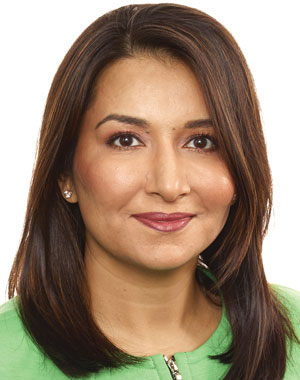
Poonam Puri
Professor, Osgoode Hall Law School, Toronto, Ont.
Although Puri may not be involved in the largest transactions of the year or most publicized litigation, her work indelibly shapes the arguments and strategies of many lawyers. Her influence is reflected by the eagerness of the Canadian legal community to listen and respond to her perspectives and observations on the current state of the law and recommendations regarding what can be done to develop a more fair, just, and responsive legal system. She has directed research programs including important corporate securities law initiatives in Canada (National Securities Regulator file) and has been recently appointed by the Ontario Minister of Finance Charles Sousa, as the expert adviser for the Credit Unions’ legislative framework review. She is a respected and popular professor and highly regarded by practitioners in the corporate-commercial bar.
What voters had to say: “Exceptional talent. Unassuming trendsetter. Wise beyond her years. Will be an influence for many years to come on the corporate stage in Canada. Outstanding research and practical capabilities.”
This article was prepared with the assistance of Anastasiya Jogal





